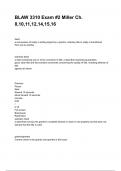BLAW 3310 Exam #2 Miller Ch.
8,10,11,12,14,15,16
deed
a conveyance of really; a writing signed by a grantor, whereby title to really is transferred
from one to another.
warranty deed
a deed containing one or more covenants of title; a deed that expressly guarantees
good, clear title and that contains covenants concerning the quality of title, including defense of
title
against all claims.
Previous
Pause
Next
Rewind 10 seconds
Move forward 10 seconds
Unmute
0:00
/
0:15
Full screen
Brainpower
Read More
quitclaim deed
a deed that conveys the grantor's complete interest or claim in real properly but that does not
warrant that the title is valid.
grantor/grantee
Current owner is the grantor and grantee is the buyer
,notarization
official fraud-deterrent process that assures the parties of a transaction that a
document is authentic, and can be trusted. It is a three-part process, performed by a Notary
Public, that includes of vetting, certifying and record-keeping.
title
generally, the legal right of ownership; under the UCC, title is determined by rules regarding
identification of goods, the risk of loss of goods, and insurable interest in the goods.
cloud to title (ex and definition)
(e.g. mechanics liens): If a search reveals "defects" in a title, the title is said to be
"clouded." This could arise from a boundary dispute with a neighbor, tax liens placed against the
property, or liens imposed for work done on the property or for uncertain claims of ownership by
heirs to property.
fee simple
in property law, an absolute ownership interest in an estate (real properly) without
restrictions; the strongest form of properly ownership.
mineral estate vs surface estate
Ownership is also said to extend "to the center of the earth," meaning
fee simple ownership includes the right to minerals and oil under the land. Those assets, like
other
features of land, can be sold or rented separately from the main piece of property. Subsurface
mineral rights are often legally separated from ownership of the surface land.
fee simple absolute
right to exclusive possession of a particular piece of land for an indefinite
time, as well as the right to dispose of the land as the owner pleases.
,tenancy in common
an ownership interest in which each tenant (owner) has an undivided interest
in properly. More than one party owns the properly in joint possession, but there are separate
titles so that when an owner dies, her interest passes to her heirs.
undivided interest
When more than one party owns real estate, it is often held in a tenancy in common, where the
parties have an undivided interest that passes to their heirs on death; or it may be in a joint
tenancy, which is also an undivided interest, but the other owner has a right of survivorship.
joint tenants with ROS
tenancy with two or more co-owners who take identical interests by the
same instrument and with the same right of possession. It differs from a tenancy in common in
that
each joint tenant has a right of survivorship to the other's share.
trusts
the right, enforceable in equity, to the beneficial enjoyment of property to which another person
holds legal title; a property interest held by one person (trustee) at the request of another
(settlor) for the benefit of a third party (beneficiary).
beneficiary
a person for whose benefit property is held in trust; usually a person designated to
benefit from an assignment, such as in a will or insurance policy, or to receive something by a
legal
arrangement or instrument.
trustee
a person who has legal title in some property, such as the property of a bankrupt
business, held in trust for the benefit of another person (the beneficiary).
servitudes
, a burden that rests on one estate for the benefit of another. Servitudes on land may
impose obligations on the owner of land to permit something to be done on the properly by
another, or it may be a restriction on the use of properly that would normally be permitted.
easement
the right to use the property of another in a particular manner. Most commonly, this is a
right of access to cross one piece of property to reach another piece of property or the right to
have
utilities go across, on, or under property. It is a right that is said to "run with the land."
profit
a servitude that gives the right to pasture cattle, dig for minerals, or otherwise take away some
part of the soil.
adverse possession
(easement by prescription) a method by which one obtains the right to property
by following specific rules under which a non-owner may be declared to be the lawful owner.
This
normally requires open possession of the property and restraining others from use of the
properly
for a period of time required by state law and may require payment of properly taxes.
10-year period
Statute of limitations of 10 years. After 10 years the adverse possessor is entitled to
apply to the registrar to become the new registered owner. The registrar then contacts the
registered
title holder and notifies him of the application. If no proceedings are launched for two years to
eject
the adverse possessor, only then would the registrar transfer title.
covenants
in property law, an agreement by two or more parties, in writing, that places certain
restrictions on the use of property or obligates the owner of the property to take specific actions




